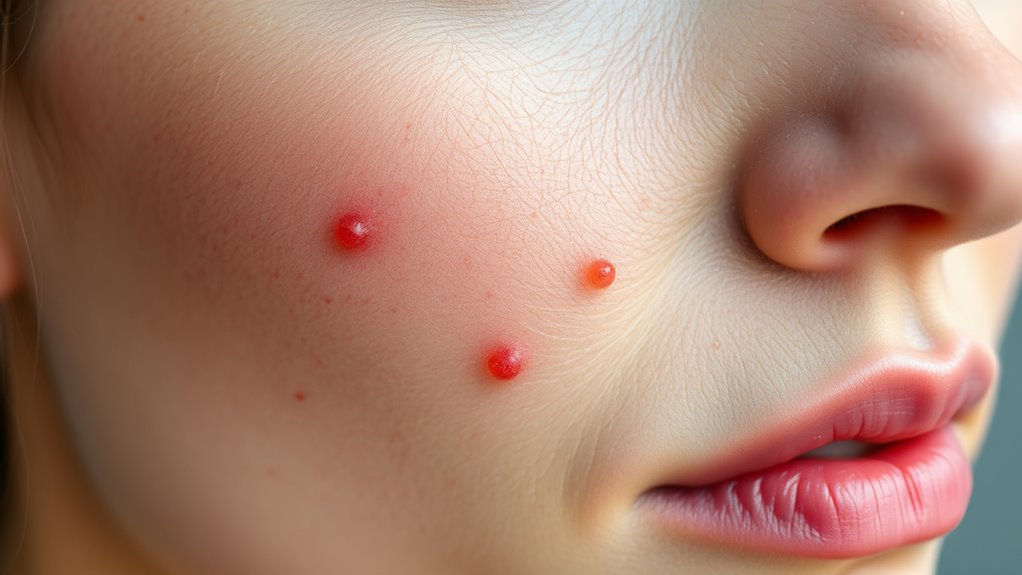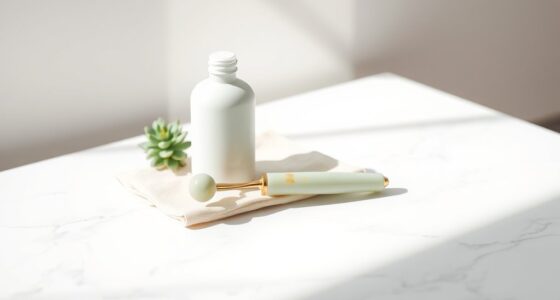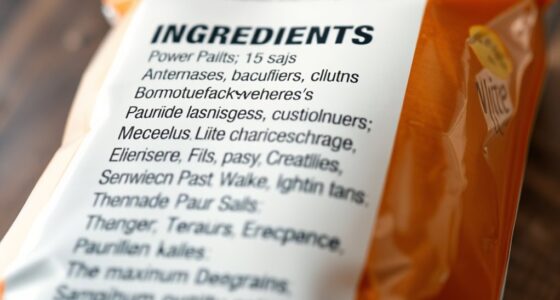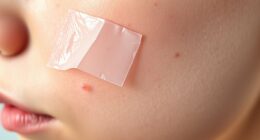If your skin feels sore, looks red, or becomes more sensitive after exfoliating, you might be overdoing it. Signs like persistent redness, dryness, or a rough texture indicate your skin’s barrier is stressed. Micro-tears or premature aging can also occur from aggressive scrubs or strong chemical acids. If you notice these hidden signs, it’s a red flag. Keep going to discover how to protect your skin and restore its health.
Key Takeaways
- Persistent redness, sensitivity, or burning after exfoliation indicate the skin is overwhelmed or damaged.
- Increased reactivity to products previously tolerated suggests over-exfoliation.
- Skin feels rough, dull, or tight despite regular exfoliating routines.
- Visible micro-tears, cuts, or micro-inflammation are signs of aggressive exfoliation.
- Over-exfoliated skin may show signs of inflammation, irritation, or prolonged redness.
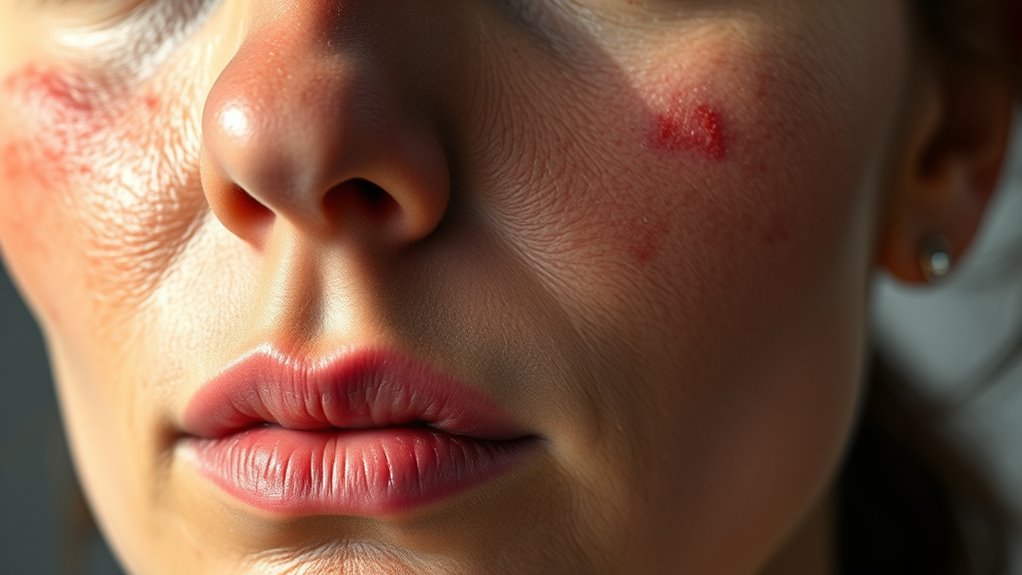
Exfoliating can boost your skin’s glow, but overdoing it can cause more harm than good. When you exfoliate too often or with too harsh products, your skin becomes vulnerable to damage, often showing signs of stress that aren’t immediately obvious. One of the most serious risks of over-exfoliating is the development of chemical burns. These aren’t always obvious at first; they might appear as redness, peeling, or a burning sensation that feels more intense than typical skin irritation. Chemical burns happen when your skin’s barrier is compromised by aggressive acids or scrubs, and you might not realize how sensitive your skin has become until the damage is done. Over-exfoliation can also lead to increased skin sensitivity, making your skin more reactive to environmental factors like sun exposure, pollution, or even skincare products you previously tolerated. Your skin might start to sting or feel tight after cleansing, and redness could become persistent, signaling that your skin is overwhelmed.
You may notice that your skin starts to feel rougher or appears dull despite your regular exfoliation routine. This is often a sign that your skin’s natural renewal process is disrupted. Instead of revealing a fresh, radiant glow, over-exfoliating strips away too much of the outer layer, leaving your skin vulnerable and irritated. This excessive removal can weaken your skin’s defenses, making it more prone to redness, inflammation, and breakouts. If you notice a burning sensation or that your skin feels sore after exfoliating, it’s a clear indication you need to cut back. Over-exfoliating can also cause micro-tears in the skin, which may lead to more pronounced irritation and even small, visible cuts, especially when using physical scrubs or overly aggressive chemical exfoliants.
Furthermore, if your skin becomes increasingly sensitive to products that once worked fine, it’s a sign to reassess your routine. Consistent over-exfoliation can cause your skin to react poorly to ingredients like retinol or acids, resulting in redness, flakiness, or dryness. To avoid these issues, pay attention to how your skin responds and limit exfoliation to a few times a week, using gentle formulas suited for your skin type. Remember, the goal is to enhance your skin’s health and glow—not to damage it. If you experience persistent discomfort, redness, or signs of chemical burns, it’s best to consult a dermatologist. Your skin’s health depends on a balanced routine that respects its natural barrier, not one that strips it down excessively.
Frequently Asked Questions
Can Over-Exfoliating Cause Permanent Skin Damage?
Over-exfoliating can damage your skin barrier, leading to increased sensitivity and potential permanent harm. It accelerates collagen breakdown, causing premature aging and loss of firmness. When you scrub or peel too often, you weaken your skin’s defenses, making it more prone to irritation and damage. To protect your skin, limit exfoliation and focus on gentle, nourishing products that support your skin barrier and collagen production.
How Often Should I Exfoliate to Avoid Overdoing It?
You should exfoliate 1-3 times a week, depending on your skin type. Use gentle scrubs for sensitive skin and consider chemical peels for deeper exfoliation, but avoid overdoing it. Pay attention to your skin’s response—if it becomes red, dry, or irritated, cut back. Remember, moderation is key to maintaining healthy, glowing skin without risking damage.
Does Over-Exfoliation Affect Different Skin Types Differently?
Ever wonder if over-exfoliating impacts your skin differently? It does. Sensitive skin may become irritated faster, losing its natural barrier and pH balance, while oily or acne-prone skin might overproduce oil to compensate. Your skin barrier’s strength determines how well your skin handles exfoliation. Pay close attention to these signs, and adjust your routine accordingly. Overdoing it can cause more harm than good, regardless of your skin type.
What Ingredients Should I Avoid if I Over-Exfoliate?
If you tend to over-exfoliate, avoid harsh chemicals like alcohol, fragrances, and strong acids, as they can further damage your skin barrier. These ingredients strip natural oils and cause irritation, making your skin more sensitive. Instead, look for gentle, soothing ingredients like ceramides and hyaluronic acid. Staying away from harsh chemicals helps protect your skin barrier, reducing stress and promoting healthier, calmer skin.
Can Over-Exfoliating Lead to Increased Sensitivity Long-Term?
Over-exfoliating can weaken your skin barrier, making your skin more sensitive over time. This increased sensitivity can lead to redness, irritation, and even premature aging as your skin struggles to repair itself. When you strip away too much of the outer layer, you risk long-term damage that compromises your skin’s resilience. To protect your skin, avoid aggressive scrubs and harsh acids, and give your skin time to recover.
Conclusion
If you ignore the signs of over-exfoliating, your skin could end up more stressed than a performer on opening night. Remember, your skin needs a gentle touch, not a relentless assault. By listening to your skin’s signals and dialing back when needed, you can avoid turning your face into a battlefield. Treat it with care, and it’ll thank you with a radiant glow that outshines even the brightest stars. Your skin’s health is worth the effort—don’t let over-exfoliating steal your glow.
